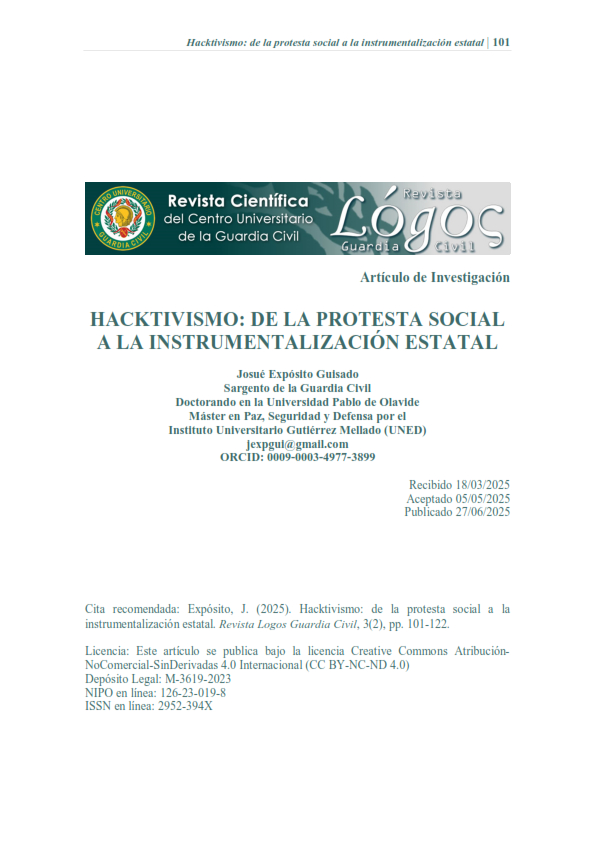Hacktivism: from social protest to state instrumentalisation of the State
Keywords:
Hacktivism, APT, cyberproxies, cyberconflict, cyberattacksAbstract
Hacktivism has evolved from an initial form of digital protest into a key tool in contemporary geopolitical conflicts. What began as a decentralized movement advocating for freedom of expression and social justice has been progressively instrumentalized by states to conduct cyberattacks, manipulate public opinion, and deploy disinformation operations. This phenomenon has been particularly pronounced in the context of the war in Ukraine, where the convergence between Advanced Persistent Threat (APT) groups and patriotic hacktivists has enabled the execution of cyber operations aligned with state interests. At the same time, the internationalization of hacktivism has led to the formation of alliances between groups from different regions, expanding its impact beyond the Russia-Ukraine conflict. Cyberspace has become an ideal battleground for controlled confrontation between states. However, the increasing sophistication of attacks and the selection of increasingly strategic targets pose serious challenges to international stability and the security of Western states.
Downloads
References
Antoniuk, D. (2024). Cybervolk: Hacktivists from India and Russia collaborate on ransomware attacks. The Record. https://therecord.media/cybervolk-india-hacktivists-russia-ransomware
Antoniuk, D. (2024). Cybervolk: Hacktivists from India and Russia collaborate on ransomware attacks. The Record. https://therecord.media/cybervolk-india-hacktivists-russia-ransomware
Auty, C. (2004). Political hacktivism: Tool of the underdog or scourge of cyberspace? Aslib Proceedings, 56(4), 212-221.
Bartlett, J. (2015). The dark net: Inside the digital underworld. Melville House.
CFR (2012). Denial of service attacks against U.S. banks in 2012–2013. Council on Foreign Relations (CFR). https://www.cfr.org/cyber-operations/denial-service-attacks-against-us-banks-2012-2013
Cyberknow (2025). Russia-Ukraine war: Hacktivist update. https://cyberknow.substack.com/p/russia-ukraine-war-hacktivist-update
CyberZaintza (2021). Grupo APT. https://www.ciberseguridad.eus/ciberglosario/grupo-apt
Dahan, M. (2013). Hacking for the homeland: Patriotic hackers versus hacktivists. International Conference on Information Warfare and Security, 51–VII. Academic Conferences International Limited. https://search.proquest.com/docview/1549245919
Denning, D. E. (2001). Activism, hacktivism, and cyberterrorism: The internet as a tool for influencing foreign policy. En J. Arquilla & D. Ronfeldt (Eds.), Networks and netwars: The future of terror, crime, and militancy (pp. 239-288). RAND Corporation.
DOJ (2018). Grand jury indicts 12 Russian intelligence officers for hacking offenses related to the 2016 election. U.S. Department of Justice. https://www.justice.gov/archives/opa/pr/grand-jury-indicts-12-russian-intelligence-officers-hacking-offenses-related-2016-election
Expósito Guisado, J. (2023). Ciberproxies: las APT como factor de riesgo futuro. Instituto Español de Estudios Estratégicos (IEEE). Boletín IEEE, (32), 815-831.
FBI (2014). Update on Sony Investigation. Federal Bureau of Investigation (FBI), Washington, D.C. https://www.fbi.gov/news/press-releases/update-on-sony-investigation
Fox, A. C. (2019). Conflict and the need for a theory of proxy warfare. Journal of Strategic Security, 12(1), 44–71. JSTOR. www.jstor.org/stable/26623077
Goode, L. (2015). Anonymous and the political ethos of hacktivism. Popular Communication, 13(1), 74–86. https://doi.org/10.1080/15405702.2014.978000
Green, K. (2016). People's war in cyberspace: Using China's civilian economy in the information domain. Military Cyber Affairs, 2(1). https://doi.org/10.5038/2378-0789.2.1.1022
Healey, J., & Grinberg, A. (2022). Patriotic hacking: No exception. Lawfare. https://www.lawfaremedia.org/article/patriotic-hacking-no-exception
Hern, A. (2017). NSA contractor leaked US hacking tools by mistake, Kaspersky says. The Guardian. https://www.theguardian.com/technology/2017/oct/26/kaspersky-russia-nsa-contractor-leaked-us-hacking-tools-by-mistake-pirating-microsoft-office
Hunsinger, J., & Schrock, A. (2016). The democratization of hacking and making. New Media & Society, 18(4), 535–538. https://doi.org/10.1177/1461444816629466
Johnson, P., & Robinson, P. (2014). Civic hackathons: Innovation, procurement, or civic engagement? Review of Policy Research, 31(4), 349–357. https://doi.org/10.1111/ropr.12074
Jordan, T. (2002). Activism! Direct action, hacktivism and the future of society. Reaktion Books.
Jordan, T., & Taylor, P. A. (2004). Hacktivism and cyberwars: Rebels with a cause? Psychology Press.
Mandiant (2022). GRU's rise: Telegram minions. https://cloud.google.com/blog/topics/threat-intelligence/gru-rise-telegram-minions
Marín, F. (2023). Hacktivismo al servicio del Estado: ciberproxies en Ucrania. Documento de Opinión. Instituto Español de Estudios Estratégicos (IEEE).
Maurer, T. (2018). Cyber Mercenaries: The state, hackers, and power. Cambridge University Press.
Muncaster, P. (2024). El hacktivismo: Evolucionando amenazas para las organizaciones. WeLiveSecurity. https://www.welivesecurity.com/es/cibercrimen/el-hacktivismo-evolucionando-amenazas-organizaciones
Olson, P. (2012). 5 things every organization can learn from Anonymous. Forbes. http://www.forbes.com/sites/parmyolson/2012/06/05/5-things-every-organization-can-learn-from-anonymous/
OPTIV (2023). Russia/Ukraine Update - December 2023. https://www.optiv.com/insights/discover/blog/russiaukraine-update-december-2023
Popovic, M. (2015). Fragile proxies: Explaining rebel defection against their state sponsors. Terrorism and Political Violence. https://doi.org/10.1080/09546553.2015.1092437
Rondeaux, C., & Sterman, D. (2019). Twenty-first century proxy warfare: Confronting strategic innovation in a multipolar world since the 2011 NATO intervention. New America. https://d1y8sb8igg2f8e.cloudfront.net/documents/Twenty-First_Century_Proxy_Warfare_Final.pdf
Sauter, M. (2013). “LOIC will tear us apart”: The impact of tool design and media portrayals in the success of activist DDOS attacks. American Behavioral Scientist, 57(7), 983–1007. https://doi.org/10.1177/000276
Schrock, A. R. (2016). Civic hacking as data activism and advocacy: A history from publicity to open government data. New Media & Society, 18(4), 581–599. https://doi.org/10.1177/1461444816629469
Torres Soriano, M. (2017). Guerras por delegación en el ciberespacio. Revista del Instituto Español de Estudios Estratégicos, (9), 15-36.
(2018). El hacktivismo como estrategia de comunicación de Anonymous al cibercalifato. Cuadernos de Estrategia, (197), 197-224.
Van Der Walt (2025). Reflecting on three years of cyber warfare in Ukraine. ComputerWeekly. https://www.computerweekly.com/opinion/Reflecting-on-three-years-of-cyber-warfare-in-Ukraine
Vegh, S. (2005). The media’s portrayal of hacking, hackers, and hacktivism before and after September 11. First Monday. http://uncommonculture.org/ojs/index.php/fm/article/view/1206/1126

Downloads
Published
How to Cite
Issue
Section
License
Copyright (c) 2025 Josue Exposito Guisado

This work is licensed under a Creative Commons Attribution-NonCommercial-NoDerivatives 4.0 International License.
-
Attribution — You must give appropriate credit, provide a link to the license, and indicate if changes were made. You may do so in any reasonable manner, but not in any way that suggests the licensor endorses you or your use.
-
NonCommercial — You may not use the material for commercial purposes.
-
NoDerivatives — If you remix, transform, or build upon the material, you may not distribute the modified material.
- No additional restrictions — You may not apply legal terms or technological measures that legally restrict others from doing anything the license permits.



